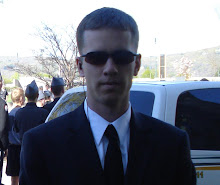It has occurred to me that perhaps not everyone who reads this (while I can't imagine a whole lot of people actually do read) don't know some of the basics about how West Point works, so let me answer some questions commonly asked to us. If you have one that I don't answer, leave it in the comments section!
Q: What is that (i.e. West Point)?
A: West Point is also known as the US Military Academy and is sort of like the Army's college. It's a four year school that also integrates military training into the "educational experience." There are about 1300 new cadets brought in each year and about 1000 graduate at the end of four years.
Q: So are you an officer when you graduate?
A: Yes, each person who graduates is commissioned as a Second Lieutenant (2LT) in the US Army.
Q: How much does West Point cost you?
A: West Point is tuition free and we are given a small salary as well; everything is paid for by the government/taxpayers. What the government/taxpayers do ask in return is five years of service on active duty, plus three years in the Individual Ready Reserve (IRR). You can get higher preference for your Army branch, post, or graduate school options, but then you incur more service.
Q: So do you have a major? Is it like a regular college?
A: The simple answer is that we are regular college kids that wear uniforms to class. It's a little more complicated than that, but that's the gist of it. Our first two years are all mandated classes and then your last two years are primarily class in your major. West Point is traditionally known as an engineering school, but we have others like history, foreign language, management, art/philosophy/literature, politics, all that sort of stuff (but it's all a Bachelor of Science degree). Everyone who isn't a math or science major also takes a three course engineering sequence (comes close to a minor). I am a management with a computer science sequence.
Q: Where do you go when you graduate?
A: Everyone first goes through their Officer Basic Course (OBC), the length and location of which depends on your branch (branch is your basic job description: infantry, armor, aviation, engineers, signal, transportation, chemical, artillery, etc.). I branched quartermaster (aka logistics) and will have a 16 week basic course at Fort Lee, Virginia. We also pick our first duty station (a.k.a. "post") based on the allotments given by the Army Human Resource Command (HRC). Post options for quartermaster were Fort Bliss, TX, Fort Bragg, NC, Fort Campbell, KY, Fort Carson, CO, Fort Drum, NY, Fort Hood, TX, Fort Leonard Wood, MS, Fort Lewis, WA, Fort Riley, KS, Fort Stewart, GA, Fort Richardson, Alaska, Germany, Hawaii, Hunter Army Airfield, GA, and Korea. I choose Fort Bragg, home of the 82nd Airborne Division. Once there, sometime next March, I'll actually begin working.
Q: What do you do on the weekends?
A: In the fall, a good portion of our weekends are taken up by football games (mandatory events for us). Some weekends are designated as "Commandant's" weekends and there will be either some military training exercises or room and uniform inspections. Other weekends are designated as "Dean's" weekends and there is a mandatory study hall for any cadets with failing grades. There are also "B" weekends in which we can leave, the frequency is according to our class privileges (seniors have unlimited passes, juniors have four, sophomore have 2, and freshmen have 1 pass per semester). You can have a car here starting after spring break of junior year, so that obviously makes leaving more often possible.
Subscribe to:
Post Comments (Atom)

I have a question - WHY DIDN'T YOU CHOOSE HAWAII?!?!?!?! I could join the PTA in Hawaii.
ReplyDeleteBut ... I'm probably over my 20 question limit ... unless, of course, my question count resets every day.
I maybe should have, North Carolina seemed like the logical choice at the time though. I'm still excited for moving there, the weather will hopefully be warmer in general! (I'm not completely sure about the rules around the 20 question limit)
ReplyDelete